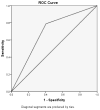Psychometric evaluation of the youth eating disorder examination questionnaire in children with overweight or obesity
- PMID: 28205275
- PMCID: PMC5505789
- DOI: 10.1002/eat.22693
Psychometric evaluation of the youth eating disorder examination questionnaire in children with overweight or obesity
Abstract
This study evaluated the psychometric properties of the Youth Eating Disorder Examination Questionnaire (YEDE-Q) and its utility for detecting loss of control (LOC) eating (i.e., eating episodes, regardless of size, involving a perceived inability to control what or how much one is eating) among school-age children with overweight or obesity. Identifying eating pathology, particularly LOC eating, in this population may facilitate treatment that improves weight outcomes and reduces eating disorder risk. Children with overweight or obesity (N = 241; 7-11 years) completed the YEDE-Q and abbreviated Child EDE (ChEDE) to assess LOC eating, prior to entering a weight management treatment trial. Confirmatory factor analyses (CFA) were conducted on children's YEDE-Q responses and compared to the standard adult EDE-Q factor structure and newer, alternate factor structures. CFA supported a three-factor structure, which distinguished youth with versus without LOC. The YEDE-Q showed low accuracy for detecting LOC eating as measured by the ChEDE, which served as the gold-standard benchmark (AUC = 0.69). Among children who endorsed LOC eating, more episodes per month were reported on the YEDE-Q than ChEDE (p < .001). The YEDE-Q may not have utility as a screener for identifying true cases of LOC eating among school-age children with overweight or obesity. Further evaluation of the YEDE-Q and the alternate three-factor structure is warranted.
Keywords: assessment; children; eating disorder pathology; loss of control eating; overweight.
© 2017 Wiley Periodicals, Inc.
Conflict of interest statement
The authors report no conflicts of interest.
Figures

Similar articles
-
Assessment of binge eating in overweight youth using a questionnaire version of the Child Eating Disorder Examination with Instructions.Int J Eat Disord. 2007 Jul;40(5):460-7. doi: 10.1002/eat.20387. Int J Eat Disord. 2007. PMID: 17497710 Free PMC article. Clinical Trial.
-
Validity of the Greek Eating Disorder Examination Questionnaire 6.0 (EDE-Q-6.0) among Greek adolescents.Psychiatriki. 2015 Jul-Sep;26(3):204-16. Psychiatriki. 2015. PMID: 26480225
-
Factor structure and construct validity of the Eating Disorder Examination-Questionnaire in college students: further support for a modified brief version.Int J Eat Disord. 2015 Apr;48(3):284-9. doi: 10.1002/eat.22358. Epub 2014 Oct 27. Int J Eat Disord. 2015. PMID: 25346071 Free PMC article.
-
Prevalence of binge and loss of control eating among children and adolescents with overweight and obesity: An exploratory meta-analysis.Int J Eat Disord. 2017 Feb;50(2):91-103. doi: 10.1002/eat.22661. Epub 2016 Dec 30. Int J Eat Disord. 2017. PMID: 28039879 Review.
-
Loss-of-Control Eating and Obesity Among Children and Adolescents.Curr Obes Rep. 2019 Mar;8(1):33-42. doi: 10.1007/s13679-019-0327-1. Curr Obes Rep. 2019. PMID: 30701372 Review.
Cited by
-
Interoceptive Exposure Impacts Food-Cue Extinction in Adolescents With Low-Weight Eating Disorders: A Functional Magnetic Resonance Imaging Study.J Am Acad Child Adolesc Psychiatry. 2025 Feb 25:S0890-8567(25)00106-6. doi: 10.1016/j.jaac.2024.12.013. Online ahead of print. J Am Acad Child Adolesc Psychiatry. 2025. PMID: 40015474
-
Accelerometer-Based Physical Activity and Shape and Weight Concerns Among Youth With Overweight and Obesity: A Pilot Exploratory Ecological Momentary Assessment Study.Child Obes. 2024 May;20(4):236-242. doi: 10.1089/chi.2022.0236. Epub 2023 May 26. Child Obes. 2024. PMID: 37253094 Free PMC article.
-
Grocery Delivery to Support Healthy Weight Gain Among Pregnant Young Women With Low Income: Protocol for a Randomized Controlled Trial.JMIR Res Protoc. 2022 Aug 5;11(8):e40568. doi: 10.2196/40568. JMIR Res Protoc. 2022. PMID: 35930351 Free PMC article.
-
Assessment of loss-of-control eating in healthy youth by interview and questionnaire.Int J Eat Disord. 2020 May;53(5):510-519. doi: 10.1002/eat.23262. Epub 2020 Mar 23. Int J Eat Disord. 2020. PMID: 32202658 Free PMC article.
-
Measurement invariance of the Eating Pathology Symptoms Inventory (EPSI) in adolescents and adults.Eat Behav. 2021 Aug;42:101538. doi: 10.1016/j.eatbeh.2021.101538. Epub 2021 Jul 2. Eat Behav. 2021. PMID: 34247036 Free PMC article.
References
MeSH terms
Grants and funding
LinkOut - more resources
Full Text Sources
Other Literature Sources
Medical

